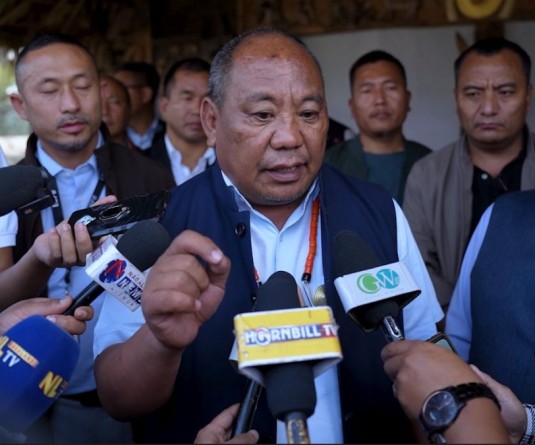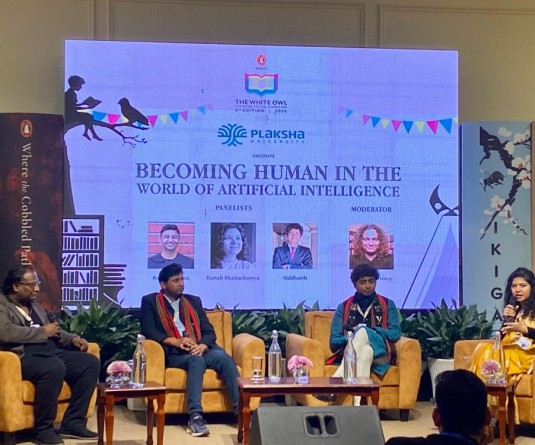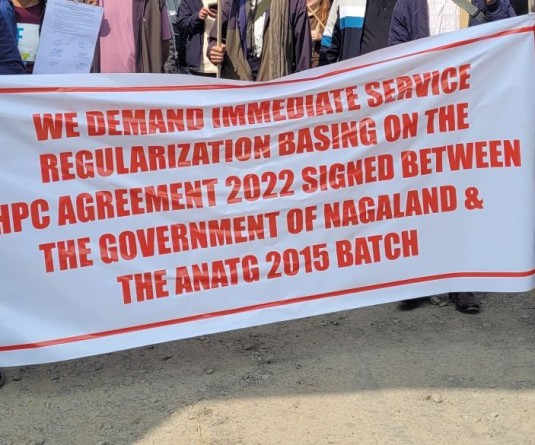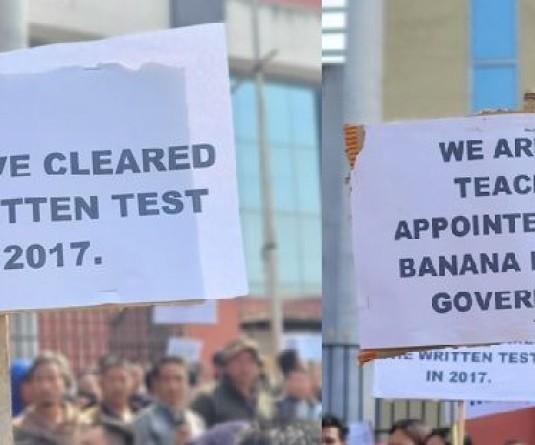Charles Chasie, Author & Independent Researcher (3rd from R, second row) seen with the Editors of the book- Sentinaro (Left, 2nd row) and Vizovono Elizabeth (2nd from R, second row) along with some of the contributors whose works are featured in the anthology.
Morung Express News
Kohima | March 25
For Nagaland, 60 years after statehood and 30 years after having its own university, Author & Independent Researcher, Charles Chasie today remarked that “this work of bringing so many Naga writers together could turn crucial for our society at this juncture of managing the contradictions of our society that we have inherited in the 1940s without any choice.”
He was addressing the launch of ‘Homegrown: Anthology of New Writings from Nagaland’, a first of its kind edited by Sentinaro and Vizovono Elizabeth at Rivenburgs Memorial Hall, Baptist College Kohima. He noted that, “today finding that while we exist in the 21st century, with all the paraphernalia of modernism, with its attending rat-race of materialism, most of us are really still living in the 1940s and trying to manage the contradictions and baggage inherited then.”
This is largely because, he said, “our people have not had the time or space to reconcile, digest and assimilate what happened then and our history continues to remain unhealed and we continue to remain a wounded society and a wounded people.”
“But what can we expect of people who are living in a kind of limbo, trying to manage to live with dual identities and personalities? Are our people able to tackle the core issues or are we just touching the symptoms in a bid to do something and to give ourselves a good feeling that we are doing something?” he also posed.
Stating that a society either has a sense of sin or a sense of drift, he emphasized that “if we cannot agree on a definition of sin, I am sure we can all agree that much of the time, our people and society are hopelessly drifting without a sense of proper direction.”
And in this context, he underscored that “it is up to the thinkers and writers, the knowledge-keepers and idea-givers, to go to our roots of the problems even if others won’t do it and then try to reverse the trends and give direction to society.”
“This is the most important role of the thinkers and writers in society and unless they do their duty, society will not progress further,” he added.
Voices of emerging writers reflect and represent what Naga writing is today
Talking about the book, Sentinaro highlighted that this anthology was conceptualized with the intention to bring together the voices of the younger emerging writers, in the hope that this will reflect and represent what Naga writing is, as of today. While the pioneers wrote about our history, politics, folklore and culture because these were what engaged them and their lives at the time, which are still very much part of our lives, she noted that “but at the same time, with the fast paced changes taking place globally, there are new challenging issues that the youth of today are faced with.”
Towards this end, she said, “there is definitely a shift in focus in the writings of the emergent generation” while putting across that focus of this book therefore, is exclusively on these new writings that reflect the gradual evolution of the Naga literary scenario, particularly from writers who are ‘homegrown’ in Nagaland.
Vizovono Elizabeth said that the selection of writers for this anthology is quite subjective while highlighting that in the process of putting the volume together, they discovered so many new and younger talents. “I feel this is just the tip of the iceberg”, she expressed while putting across that “there is so much potential for our literature to grow.”
She also expressed hope that this anthology will give some sense of direction to our literary landscape. “Let us continue to support and encourage and learn from one another,” she said and thanked all the contributors by saying, “Your voices will remain imprinted as participants in the making of the Naga story for ages to come. Posterity will remember you for your generosity in speaking up and voicing what matters to you and ultimately to all of us.”
In her publisher’s note, Vishü Rita Krocha said that publishing “Homegrown” has reaffirmed her belief that there has never been a dearth of storytellers in our land, “and not just mere storytellers but brilliant storytellers, who, through their stories will move people, will shape the thinking of our society, will be the custodians of our history and culture and people, and the ones who will be forever remembered for the rich legacy they leave behind.”
Asserting that “we are nothing without stories”, she also noted that “people without stories, perish; people without stories are forgotten and people without stories have nothing to leave behind.”
Highlights of the event included review of the book by Dr Nigamananda Das, Professor & HoD, English Department, Nagaland University, prayer by Rev Dr Rachülie Vihienuo, Executive Director, ABCC, “Youth Culture” by Students of English Department, Baptist College, Kohima and ‘Nichu Zha’ by Vetholu Rhakho. The programme was chaired by Dr Enünü Sale, Asst. Professor, English Department, Baptist College, Kohima.
Mention may be made here that “Homegrown” is the 71st publication of PenThrill, featuring 35 Naga writers in different genres including different genres including poetry, short stories, prose essays, personal reflections, and prose poems.






